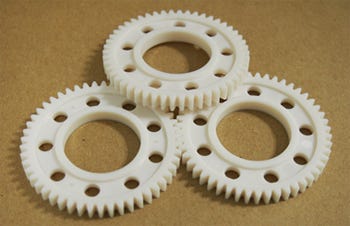Partial biobased PBT proves its processability
Resin supplier Toray Industries, Inc. (Tokyo) and U.S. renewable chemicals process technology firm Genomatica, Inc. (San Diego, CA) have successfully synthesized a partially biobased PBT (polybutylene terephthalate) using 1,4-butanediol (BDO) made with Genomatica's biobased process technology.
May 2, 2013
Resin supplier Toray Industries, Inc. (Tokyo) and U.S. renewable chemicals process technology firm Genomatica, Inc. (San Diego, CA) have successfully synthesized a partially biobased PBT (polybutylene terephthalate) using 1,4-butanediol (BDO) made with Genomatica's biobased process technology.
|
Parts molded from biobased PBT possess equivalent performance and processability to petroleum-based PBT resins. |
The successful bench-level production reportedly provides Toray a significant boost towards commercial-scale production of partially biobased PBT. Toray's tests confirmed that PBT made using this BDO has physical properties and processability equivalent to PBT made from petroleum-derived BDO, and Toray then succeeded in making prototypes of molded components.
Toray's plan is to produce a bio-based PBT at commercial scale using BDO made with Genomatica's process. Toray plans to share samples of bio-based PBT with its customers during 2013 to help develop market demand. Based on results to date, Toray expects to bring products to market as soon as supplies of this BDO are readily available from one of the producers that Genomatica licenses to use its BDO process.
Genomatica has developed a process to produce BDO from renewable feedstocks rather than petroleum. This process includes an engineered microorganism, fermentation techniques and downstream processing. Genomatica's process was used for the successful commercial-scale production of 5 million lb of BDO in November 2012.
For its part, Toray, in 1976, became the world first company to succeed in the industrial production of PBT employing direct polymerization using terephthalic acid and BDO as raw materials, and has technology and knowledge related to PBT polymerization accumulated over many years. This collective expertise helped enable Toray become the first company to publicly confirm successful downstream application of BDO made using Genomatica's process. Toray has been working closely with Genomatica for over two years, and in February 2011 produced the first PBT 'pellets' made with BDO samples from Genomatica.
PBT is used in wide-ranging applications from automobile parts such as switches and ignition coils to electrical parts such as connectors and plugs, as the material has mechanical properties such as tensile strength and tensile elasticity and well-balanced physical properties such as heat resistance. PBT is the second largest use for BDO, accounting for about 29% of all BDO worldwide, or about 700,000 tonnes per year as PBT compound.
Toray is expanding its biomass-derived materials business centered on research and development of biomass-derived polymers. The company has successfully polymerized fully renewable bio-based PET and production fibers and films from the PET and has started working on development of bio-based nylon.
About the Author(s)
You May Also Like



